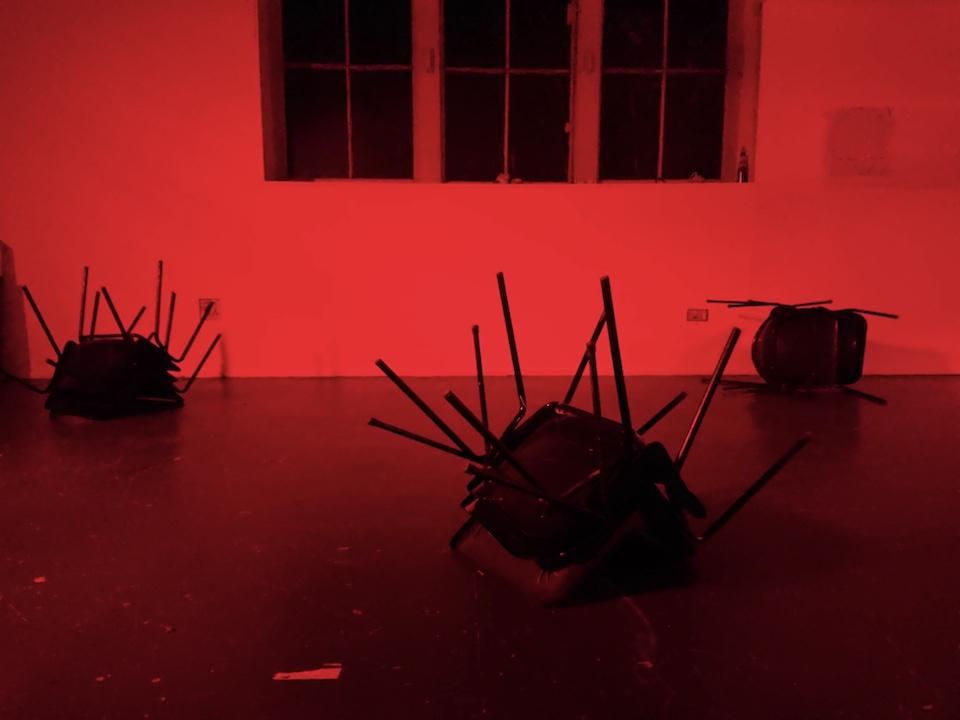Dan Newton
Primary page content
Dan Newton's MPhil/PhD Art project
Please Leave Quietly: Plagiarisms of Place and Linguistic Localities in Neighbourhood Aesthetics
One of the most notable influences of the pandemic was its elevation of pervasive imperceptibility; curtain-twitching paranoias of invisible, engineered entities mobilised by social relations and harboured by objects, as molecular interlopers unequivocally hijacked our global agency and mandated a return to the reduced proximity and precariously re-centralised immediacies of domestic cohabitation.

Dan Newton. An Intrusion of Chairs 2019 Installation view
The ensuing entanglement of the fear of the other with a dramatically elevated mistrust of the neighbour has prompted a return to questions concerning the social, ontological and syntactical structures of neighbourhood, locality, place and communitarianism (with particular reference to community watch initiatives therein) as transient, shape-shifting nuclei of dissonance, displacement and dread.
A lyrical subplot is also now announcing itself in which the sentinel streetlights adorning the signage of such schemes are experiencing an identity crisis of their own, as regional councils worldwide make the switch from longstanding sodium bulbs to LED replacements. Whilst almost banished to invisibility by their sheer ubiquity, this decision continues to evoke quietly divided contention concerning their psychological influence, ecological impact, socio-economic viability and lucent aesthetics, seasoned with sardonic narratives of nostalgia.
Moreover, as sociological and economic instabilities escalate, a furtively fecund standoff arises as streetlights are dimmed or powered-down prematurely, leaving not only their localities vulnerable, but lamppost functionality (as anything besides ornamental) in question. In a move of saturnine poetry, the lights and the neighbourhoods they oversee are nudged into furtive existential conflict.
Meanwhile, having relocated to undertake this research, I currently inhabit a flat above a large Victorian street corner pub, a standout feature on an otherwise almost exclusively residential street. It’s a curious conjugation of circumstance; my new locality quite literally sits above a local. However, the pub is permanently closed; not as a victim of the pandemic as initially suspected, but specifically to facilitate the conversion of the property into five flats, one of which I now occupy.
So, to facilitate my residence, the local downstairs is no longer local. The local’s locals have been delocalised to initiate these new localities.
I often find myself contemplating this empty space downstairs, and an uneasiness creeps in before long. What happened to the staff and its former regulars- are they still ‘local’? How or to what extent did the closure due to these interloping, colonising new flats impact their lives and their socio-recreational displacement?
As Bruno Latour remarked, “nothing is strictly local, national, supranational or global”. The local downstairs is ultimately a found object and a non-place. What does its closure say about the mobilised notion of gentrification and our understanding and usage of this formerly semi-domestic urban space? What does it say about our understanding of property? The flat is also a found object, as is the entire building and the very notional conceptualisations of neighbourhood, locality and community, as articulated through our navigation of the twenty-six readymades that comprise our very lexicon. How might I destabilise their meaning through newfound vernaculars and material auto-fictions of conviviality?
Let’s start with the pub and take it from there.
Quote source: LATOUR, Bruno After Lockdown: A Metamorphosis (Cambridge: Polity Books, 2016) pp.105
Supervisors
- Professor Andrew Renton
- Professor Michael Newman